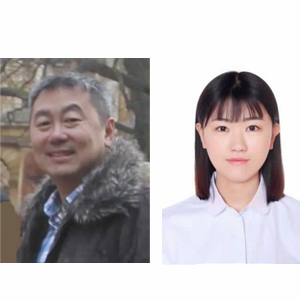Keynote Speakers

Dr. Simon James Fong
Data Analytics and Collaborative Computing LaboratoryAssociate Professor, University of Macau, Macau SAR, China
Honorary Professor, Durban University of Technology, Durban, South Africa
Adjunct Professor, ZIAT of Chinese Academy of Sciences, Zhuhai, China
Adjunct Professor, Xi'an Polytechnic University, Xi'an, China
Senior Visiting Scholar, Tsinghua University, Beijing, China
Ms. Gloria Li
University of Macau, China
Speech Title: AI in Histopathological Image Analysis for Cancer Detection: Past, Present and Future
Abstract: Since the inception of virtual microscopy in the 1990's, histology image analysis has migrated from optical microscope to visual inspection over digital histological images that were scanned and generated at high resolution. Detection of cancer and estimation of its prognosis are tedious process from the digital whole slide images because of its sheer area and complexity. Recently, by the efforts of multi-disciplinary research, artificial intelligence methods especially computer vision, object recognition, deep learning and XAI have become popular aids to grading and staging of cancer diagnoses and prognosis, by automatically analyzing over digital histopathology images. It was claimed that AI has helped pathologists to lower down the assessment errors by magnitude. Most of the research literature reports about identifying the cell types, segmenting the tumour and the cells. Current trend has it that the recognition of cells is done by deep learning due to its effectiveness in learning the features of the cells and recognizing them by their features. However, the accuracy and certainty of those histological deep learning methods are bottle-necked at the image level. Recognition rate is never perfect from solely the images. Lately it is discovered that the tumour immune microenvironment (TME) consists of many heterogeneous cell types that engage in extensive crosstalk among the cancer, immune and stroma tissues. In addition to just the cell types, the spatial organization of these different cell types in TME are observed as biomarkers for predicting metastasis, prognosis and drug responses via scRNAseq and spatial transcriptomics technologies. It opens up a new arena where AI can extend its power in analyzing the localization of cells, types of cells and their interactions, as a whole for further improving the prediction accuracy. In this talk, we will narrate the brief history, the current practices and future prospect of applications of AI on histological image analysis. This speech puts the future of AI research over histological images into a perspective that extra dimensions of analysis are in need for inferring more insights from histological image analysis. Novel models in this perspective are introduced. Future opportunities by integrating digital histopathology images with molecular omic data, spatial information, as well as meta-level analysis will be discussed for better understanding of a tumour ecosystem. During the keynote speech, our lab principal researcher, Dr. Gloria Li, will demonstrate several deep learning applications which are the cornerstone AI techniques over histopathological image analysis.
Biography: Simon James Fong graduated from La Trobe University, Australia, with a 1st Class Honours BEng. Computer Systems degree and a PhD. Computer Science degree in 1993 and 1998 respectively. Simon is now working as an Associate Professor at the Computer and Information Science Department of the University of Macau, as an Adjunct Professor at Faculty of Informatics, Durban University of Technology, South Africa. He is a co-founder of the Data Analytics and Collaborative Computing Research Group in the Faculty of Science and Technology. Prior to his academic career, Simon took up various managerial and technical posts, such as systems engineer, IT consultant and e-commerce director in Australia and Asia. Dr. Fong has published over 500 international conference and peer-reviewed journal papers, mostly in the areas of data mining, data stream mining, big data analytics, meta-heuristics optimization algorithms, and their applications. He serves on the editorial boards of the Journal of Network and Computer Applications of Elsevier, IEEE IT Professional Magazine, and various special issues of SCIE-indexed journals. Simon is also an active researcher with leading positions such as Vice-chair of IEEE Computational Intelligence Society (CIS) Task Force on "Business Intelligence & Knowledge Management", TC Chair of IEEE ComSoc e-Health SIG and Vice-director of International Consortium for Optimization and Modelling in Science and Industry (iCOMSI).
Gloria Li is currently a PhD candidate at the University of Macau. In 2017, Gloria graduated with BEng, major in • Electronic Communication Engineering, from Hebei University of Science & Technology, China. She graduated with a MSc degree on Computer Information Science in 2019. She is also the Head of Data Analytics and Collaborative Computing Laboratory, Zhuhai Institute of Advanced Technology, Chinese Academy of Science, Zhuhai, China. Ms Li is leading and managing the laboratory, in R&D as well as technological transfer and incubation. She is an entrepreneur with experiences in innovative I.T. contest, with her award-winning team in the Bank of China Million Dollar Cup competition. Her latest winning work includes the first unmanned supermarket in Macau enabled by the latest sensing technologies, face recognition and e-payment systems. She is also the founder of several Online2Offline dot.com companies in trading and retailing both online and offline. In 2021, Ms. Li has won a prize of 2nd runner-up of Global Management Challenge: WorldGMC (Macau region) by her analytics skills. Ms Li is also an active researcher, manager and chief-knowledge-officer in DACC laboratory at the faculty of science and technology, University of Macau.
